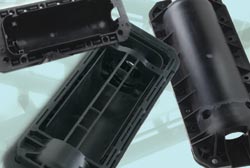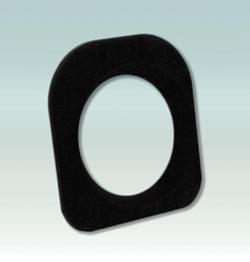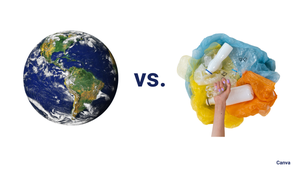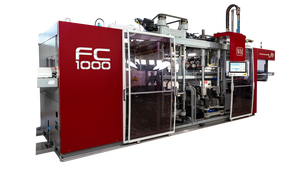October 24, 2002
To help automotive customers reduce costs, material suppliers are working with desighners and performing more application development work to convert metal parts to plastic.
|
A close connection between design and materials is enabling new metal-to-plastic conversions, such as this air bag canister housing from OSS. The Tier One supplier worked with DSM to switch the housing from cast metal to nylon 6 for cost and weight savings. |
There are some applications that IM plastics will never win over . . . at least, that’s the prevailing mentality. Thinking a bit outside the box, however, can reward OEMs and designers with a cost- and weight-saving solution by substituting plastic for a former metal or thermoset part.
Most often, these dual goals are sought by automotive suppliers, for whom metal-to-plastic conversions can mean increased business and profitability. But the same can be said for markets such as consumer goods, sporting goods, and others.
As IM plastics mature, it may seem as though all of the viable metal applications have already been converted. Not so. Development work on the “impossible†applications continues. Achieving success in these cases requires early supplier involvement so that design and materials expertise can be combined.
Air Bag Assembly
Proof that tough conversions are still happening can be found in several new automotive applications. One of the most outstanding involves Occupant Safety Systems NA (OSS, Washington, MI)—formerly TRW Vehicle Safety Systems—and material supplier DSM. Together, these companies were able to convert a cast metal air bag canister housing to an impact-modified, glass-filled nylon 6 (Akulon K224-PG8).
The housing is the first of its kind in North America. When the application was initially conceived, OSS recognized several challenges. The part needs to withstand high impact at low temperatures (-40F) and maintain sufficient strength at high temperatures (248F).
|
Another portion of the air bag assembly, the retainer and inflator ring, was also redesigned in nylon 6 for a $1.5 million annual cost savings. |
It also needs adequate strength for less than 4 seconds at 400F to stand up to operating conditions. The heat is generated by gases that burn to expand the air bag. One of the factors enabling the use of molded nylon 6 in this application was the switch from sodium azide gas to a proprietary mixture that burns at a cooler temperature.
The nylon lends excellent toughness, thermal stability, and flow properties to the housing while also providing a good surface appearance. In addition to a material solution, DSM provided FEA analysis, moldfilling simulation, and testing to help OSS meet its application challenges and produce a successful part.
In a related application, the same material was used to mold inflator housings and retainer rings that are part of the air bag assembly. Estimated cost savings compared to cast metal versions are $1.5 million/year.
Thrust Washer
Another successful conversion from metal and thermosets received a finalist award at the 2001 SPE Automotive Innovation Awards. The part, a transmission thrust washer for Ford F-Series Super Duty Trucks, is molded from thermoplastic polyimide (Aurum JCL 3030, Mitsui Chemicals). It represents the first multiple-platform commercial use of a thermoplastic in the torque converter, the hottest section of a transmission.
With a thickness of only 1.5 mm, the flat, circular washer is 50 percent thinner than a metallic needle thrust bearing, the traditional solution in this case. The thinner washer frees up space that Ford designers use to place a more robust piston for greater durability. It also saves 28g in weight and reduces cost by 35 percent.
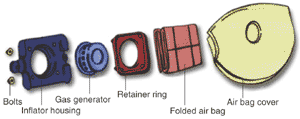
Another hallmark of the torque converter, in addition to its high heat, is extreme pressure and velocity. An internal lubricant is used in compounding the material to help it resist wear sufficiently. In addition, carbon fiber reinforcement in the polyimide material enables it to meet strength requirements.
Contact information Mitsui Chemicals |
You May Also Like
